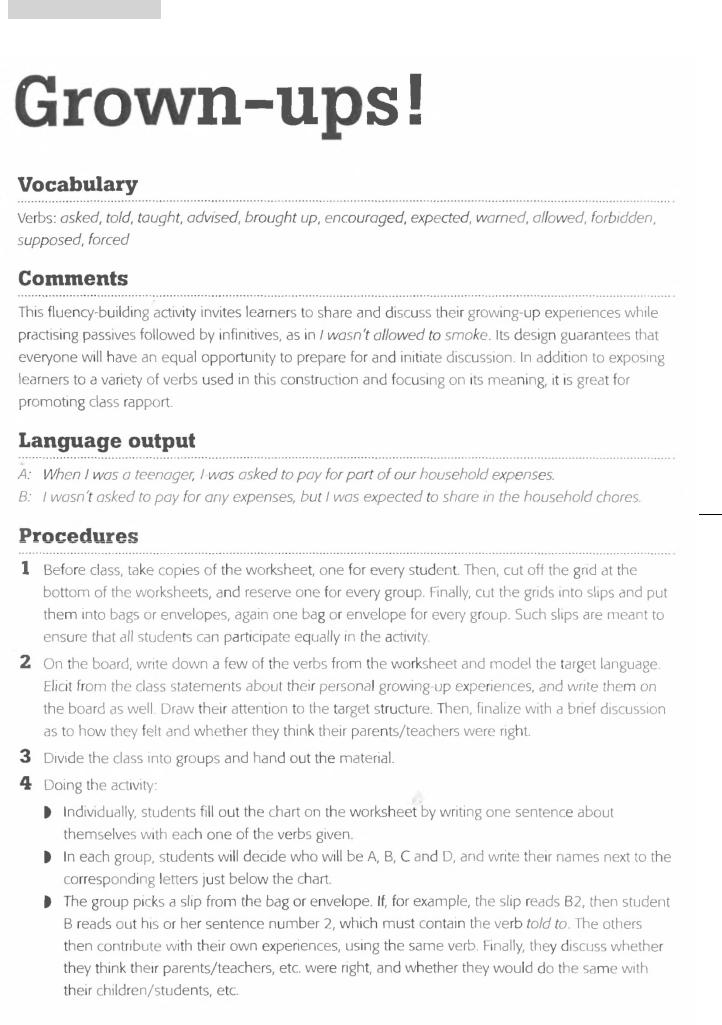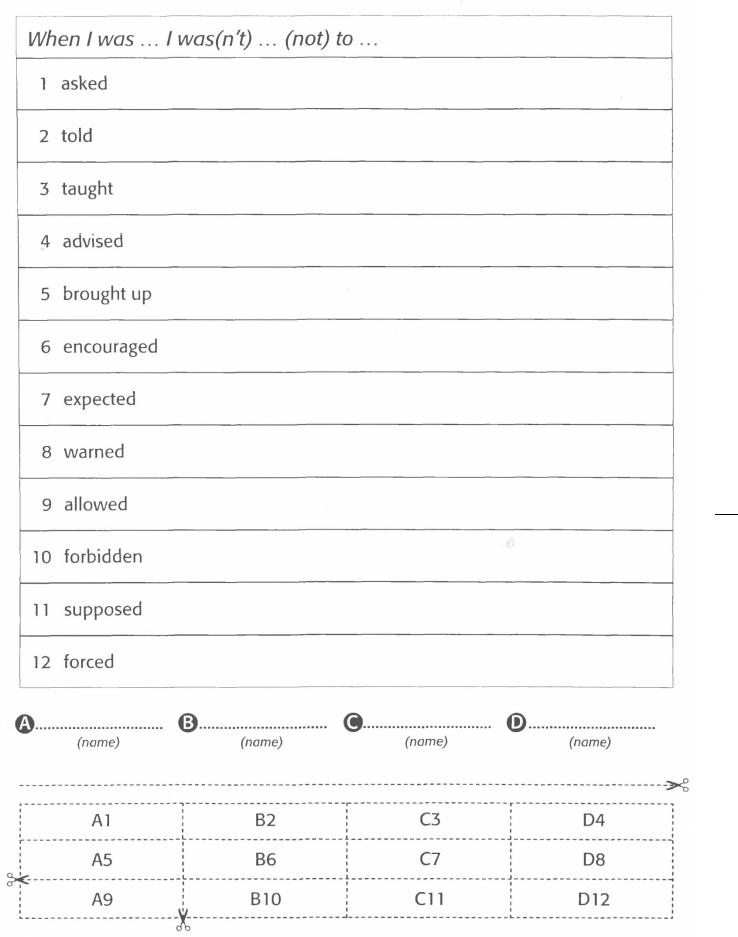
III(2)_The_Infinitive_St
.pdf
(to help them about the house?)
(to pay more attention to their studies?) (to be more polite?)
53. Open the brackets using a Complex Object where possible.
1.I want (my brother, to take) some precautions.
2.These articles will make (your hair, to stand) onend.
3.I make (myself, to exercise) and (to do) sit-ups for 10minutes every other morning.
4.Since I didn’t want (that, to happen) I took Andrew’s advice.
5.Why don’t you get (he, to go) to bed immediately?
6.I won’t have (anybody, to think) ill of her.
7.He had a desire to let (life, to go on) as if nothing had changed.
8.Each of us told a story that made (the time, to pass) quickly.
9.We expected (he, to come) by an early train.
10.Your enthusiasm makes (I, to fell)young again.
11.Do you think (he, to be) fifty?
12.I want (you, to explain) to me how to use this gadget.
13.The telephone ringingmade (she, to sit up) in bed.
14.Did they expect (she, to show) them the city?
15.I have never noticed (he, to speak) with a slight accent.
16.She heard (he, to call) her name.
17.I have always thought (my work, to be) interesting.
18.I’m sure I’ll have (he, to finish) the workon time.
19.I won’t have (my daughter, to marry) a foreigner.
20.She made (I, to feel) special.
21.I heard (someone, to open) the door and (slam)it behind her. |
31 |
22.John saw (his brother, to pickup) something and (to put) itin his bag.
23.Mary saw (her brother, to be) displeased.
24.I hear (he, to fall ill) this week. Why not call onhim?
25.The has heard (something, to happen) to Julia.
26.The neighbors didn’t want (a house, to build) inthe area.
27.The teacher expected (a new plan, to workout)in the near future.
54. Complete the sentence using a Complex Object where possible.
1.He hated (когда они опаздывали).
2.We wanted (чтобы они были счастливы).
3.The passenger expected (что его багаж будет отправлен в Рим).
4.He felt (как что-то тяжелое стукнуло его по ноге).
5.He felt (как его голос задрожал от волнения).
6.Motherused to consider (что он был неправ).
7.They heard the woman (вскрикнула) and saw (как она упала на землю без сознания).
8.Have you heard (что ваш друг заболел и не сможет посещать занятия две недели)?
9.The doctor ordered (чтобы палату проветривали каждые 2 часа).
10.The newcomerhad (чтобы портье принес его вещи немедленно).
11.His remark made (всех чувствовать себя неловко).
12.Let us try to get (чтобы он присоединился к нашей компании).
13.People who knew her felt (что она была женщиной с сильным характером).
14.He saw (что она недовольна достигнутым соглашением).
15.He saw out of the corner ofhis eyes (как она ухватилась за край стола, чтобы не упасть).
16.Paul heard (как телефон позвонил дважды).
17.If you want (чтобы мы добрались) there before dark you should let (нам выехать) at once.

18.We don’t allow (никому разговаривать) в библиотеке. 19.We saw (как он припарковал машину и пересек)the road.
20.The coach didn’t let (никому наблюдать) team practicing.
55. Paraphrase using a Complex Object.
1.I expect that he’ll be hard to deal with.
2.The boy wanted to go skating but his mother didn’t let him.
3.The patient didn’t want to take the medicine and we couldn’t make him.
4.They entered the room, stayed there a minute and then left. We noticed that.
5.The man dropped an envelope in the letterbox.He saw it.
6.We thought that they were lucky.
7.We never suspected that he was capable of such an action.
8.Father likes it when his tea is strong.
9.What I want is that everything should be ready in an hour.
10.I saw something strange: the plate slipped from her hands and fell on the floor.
11.The wind was rising. The windows rattled (to make).
12.Somebody motionedher name. Lily heard it.
13.At the thoughtof it I felt sad. (to make)
14.I never smoke indoor. My mother doesn’t like it.
15.We consider that the youngman is a promisingwriter.
16.He is an honest boy. We know it.
17.My children don’t watch TV shows that are violet. I don’t let them.
18.I’d like to see how he would say it to my face.
19.Don’t read my letters. I hate it.
20.I have always thought my work is very interesting. |
32 |
56.Translate using a Complex Object where possible.
1.Мы увидели, как он выбрал цветы и подарил их своей девушке.
2.Мать позволила детям организовать вечеринку.
3.Я считаю, что он прав в своем решении.
4.Я не позволю говорить такие вещи в моем присутствии.
5.Поручите вашему секретарю сделать копии этих документов.
6.Почему вы заставили нас так долго ждать?
7.Я почувствовал, что этоправда, и почувствовал, как у меня заколотилось сердце.
8.Он видел, что она его не понимает.
9.Они не видели, как я взял кольцо.
10.Я не люблю, когда имя упоминают на собрании.
11.Все слышали, как профессор упомянул об этих фактах в своей лекции.
12.Я слышал, что он уже уехал на север.
13.Дети увидели, что отец взволнован и спросили его, в чем дело.
14.Мы почувствовали, что он не заметил нас.
15.Я не хочу, чтобы работа делалась в спешке.
16.Ты не хочешь, чтобы это было забыто?
17.Им бы хотелось,чтобы на этом месте был построен дом.
18.Студент не ожидал, что его лекцию прослушают с таким вниманием.
19.Хотите ли вы, чтобы их познакомили с вами?
20.Мы заметили, как мальчишки забрались вчей-то сад.

57.Use the Active Infinitive or the Passive Infinitive (with or without "to"). Comment on the statements.
1.If you want people (notice) your faults start giving advice.
2.Love is the feeling that makes a woman (make) a man (make) a fool of himself.
3.A man must have something bigger than himself (believe) in.
4.Don't ask questions if you don't want (tell)lies.
5.Don't talk much if you want (listen) to.
6.When you have nothing (say), say nothing. (C. Colton)
7.(Like) what you have is (have) what you like. (C. Colton)
8.It is difficult (live) when you no longer believe in your dreams coming true.
9.Ask yourself always: how can this (do) better. (C. C. Lichtenberg)
10.Unpleasant things shouldn't (put off).
11.You shouldn't (bite) the hand which feeds you.
12.Love is a power too strong (overcome) by anything but flight. (M. Cervantes)
13.An angry woman is not easy (handle).
14.Flattery is like Cologne water, (smell) but (not swallow).
15.They say that married men are more inventive than single men. They have (be).
16.History is always written wrong, and so always needs (rewriting). (G. Santayana)
17.(Know) all is (forgive) all. (Priestly)
18.He who is born (hang) will never (drown).
19.A great statesman, like a good house-keeper knows that cleaning has (do) every morning. (A. Maurois)
20.Dictionaries are like watches: the worst is better than none, and the best cannot (expect) to go quite true. (Dr. Johnson)
21.Sometimes it is more important (discover) what one cannot (do) than what one can (do).
22.It's for you (decide) whether (learn) and make progress or not (learn) and waste your time.
23.Personally I am always ready (learn), although Ido not always like (teach). (W. Churchill) |
33 |
24.Some books are (taste), others (swallow), and some few(chew) and (digest).
25.(Know) what has (do) then (do) it comprises the whole philosophy of practical life. (W. Osler)

58. Read the text, fill in the gaps with proper forms of the infinitive.
Urban decay is when parts of the city becomerun-down and undesirable …………………. (live in). People have …………………. (live) in cramped conditions or slumshouses with outside toilets, without hot water or central heating. At the same time, there are empty buildings, which are vandalizedor derelict gap sites where buildings have been pulled down. As factories and housing are in the same areas, air and water pollution is common.
There are a number of schemes…………………. (reduce) the problems of urban decay. One of them is comprehensive redevelopment when you knock down all the buildings and start from scratch. It is felt …………………. (need) in places where the problems are especially bad. Old houses are usually replaced by new flats and multi-storey high-rise buildings. This approach is often criticized as it destroys the social fabric of the areapeople no longer know their neighbors, they are uprooted and moved away from their friends and relations.
Another solutionis urban regeneration. Its idea is…………………. (renovate) the existing housing and improve the environment and economy. It may involve new roofs, rewiring the houses and fitting central heating, double glazing and the like, combining two small flats into a largerone, improvingthe environment by landscaping, encouraging businesses…………………. (set up) in the areas with grants and loans. This has proved more popular as people are not rehoused and are able…………………. (stay) in their own area.
34
Discuss possible solutions to the problem raised in the text, use the prompts below.
It’s essential/necessary …
It seems/appears to be sensible …
59. A) Read the following text.
BLAIR TO POSE FOR HOLIDAY PICTURES
Tony Blairdid a surprise U-turn yesterday and agreed to a family photo-shoot at the start of his holiday. Twenty-four hours earlier, the Prime Minister had refused to pose for pictures with wife Cherie and their four children. They were furious that newspapers had published pictures on Sunday and Monday of their baby Leo’s christening.
It appeared they take their revenge by calling off the now traditional photo session at the start of their three-week break in Italy and France. But late yesterday the spokesman for the Premier reported that the family would turn out for cameras after all. He said the Blairs wished their children to be able to grow up without the constant attention of the media. “However, they accept that there is bound to be interest in their family. It is clear the media would like some kind of photocall at the start of the family holiday. The Prime Minister and Mrs. Blair are happy to do this. Then they continue their holiday in private. The most constructive way to keep the balance between privacy and public interest in photos of the family is for them to make pictures during the first few days of their holiday.”
It is thought that the Blairs realised they could face three weeks of unwanted attention from photographers if they didn’t agree.
(The Mirror, August, 2000)

B) Make statements about the matter using different infinitive patterns.
Model: Tony Blairis reported tohave agreed to a family photo-session.
Tony Blairseems tohave changed his mind about a photo-session.
Tony Blairturned outto be ready for a family photo-session.
Tony Blairis sure topose for pictures.
60. A) Read the following article.
LOST ONA CALMDARK SEA
At 5:33 on a sunny Friday afternoon nine days ago, Mrs. Clackson, the wife of an experienced, 58-year-old sailor Adam Clackson, called the coastguard station and said he had left the Dutch coast four days earlier to sail his yacht, the Tuila, across the North Sea. Since then the craft and its crew of three more people had not appeared.
For the coastguards, and the families of the four crew, last Saturday morning brought a brief moment of hope. First, a crew of the coastguards’ plane said they had seen red cushions similar to those on board the yacht floating on the waves. It turned out that they were brightly painted timbers. Then it seemed that a gas bottle from the Tuila was spotted. It turned out that it was lobster pots (корзина для ловли омаров). A child’s shoe was reported – and even found by a helicopter – but had nothing to do with the missing yacht. They thought they had seen a life-raft. It turned out to be a clutch of party balloons bobbing on the calm sea.
So what had happened to the Tuila? The brutal truth is that nobody knows. There is only a slim chance that the yacht might be drifting, hundreds of miles off course. The photographs of the Tuila show that it had not been fitted with the special radar reflector. It also appeared that the Tuila hadn’t had emergency radio beacon which could send out a distress signal. Though the wife thinks that 35 Clackson was given one. It is impossible to know what happened in the North Sea 10 days ago, but everyone agreed that the most likely explanation was that the Tuila was simply run over by a big vessel.
B) Make statements about the matter using different infinitive patterns.
Model: Mrs. Clackston is known to have reported the disappearance of her husband. Mrs Clackston is supposed to be unawareof her husband’s whereabouts.
She was desperate tofind him.

61. A) Read the following article.
THE DAY AFTER,ANDTHE FULL HORROREMERGES: 70 DEAD,100STILL MISSING
The full scale and horror of train disaster was emerging last night as the death toll passed 70, with a further 100 people still unaccounted for. If the worst fears of officials are realised, the crash would be the most serious in Britain formore than 80 years. Whilst police hope the 100 people report as possible having joined the two trains turn up safe and well, they admit the death toll islikely to rise still further.
One of the few people to have escaped from the first class carriage said last night he saw only “four or five” others struggle free. There are a hundred others reported as missing and police are trying to trace them down.
Amid growing public anger over Tuesday morning’s crash, it emerged yesterday that the driver of one of the other two trains involved had qualified just two months before. It said that Michael Hodder drove his train (Thames Trans turbo service) through a red light just minutes after leaving station and seconds before colliding with the packed rush-hour express heading into London at 8 a.m.
Thу Government has announced they will definitely hold a full public inquiry into the accident. The railway company released a statement that appeared to admit that the Thames Trains serviced was responsible for the accident. The statement reads: “Investigations will now concentrate on the behaviour of the Thames Turbo train following reports that it had passed a signal at danger (a red stop signal).”
A railtrack source later admitted that there were, in effect, just two possible causes of the accident – a failure of the brakes on the Thames Trains service or else error on the part of Mr Hodder. However, the train drivers union pointed out that the drivers leaving Paddington could hardly see the signal because of its location. This claim has been made for several years.
Around 40 survivors remained in hospital last night. Hospital said it had received a number of 36 calls from increasingly desperate families asking them to check the patients’ lists as they had still not heard from relatives, and they believe the relatives were on the trains. A number of walking wounded who had discharged themselves following the accident had returned to hospital suffering from shock.
The worst rail disaster in Britain this century was in 1915 when two trains collided, killing 227. In 1952 112 people were killed and 340 hurt when two express trains collided and a third ran into the wreckage at Harrow in London.
B) Make statements about the matter using different infinitive patterns.
Model: The train drivers union pointed out that the drivers leaving Paddington could hardly see the signal because of its location.
The train drivers union pointed outthat the signal’s location made it difficult for it to be seen
by drivers leaving Paddington.

62.Read the following article. Find and correct the twenty-five errors in the use of infinitives. In some cases the form of the infinitive is incorrect. In other cases infinitives aren't used where they should be used or are used where they shouldn't be used. In some cases the infinitive is correct.
to
life. Elders should be encouraged accept realistic challenges like these.
In order ^ enjoy a full life in ones later years, it is vital maintaining close relationships and to |
|
||
keep physically active. To involve oneself in absorbing interests is important, as thisinvolvement |
|
||
encourages a person to expanding and engage in healthy activity. |
|
|
|
There is example after example to illustrates how rewardinglife can be at an older age. For |
|
||
instance, an elderly widower in California has learned how to knitting, an activity that allows him not |
|
||
only artistic expression, but also opportunities meeting women available for to socialize with.Nowhe |
|
||
is so often invited dine at ladies' homes that he hasn't needed cook a meal in four months. In New York |
|
||
State, a seventy-two-year-old grandmother took up to run six years ago and last year ran all twenty- |
|
||
six miles of the New York Marathon. This year she expects being awardedt |
a prize for having made the |
|
|
most improvement in speed withinone year. A Canadian couple |
developed their lifelong interest |
|
|
in to ice skate into the most successful skating school in eastern Ontario, and they are preparing open |
|
||
another school near Boston. In California, a ninety-two-year-oldwoman who is a Scrabble champion |
|
||
wrote a how-to book on the subject, and she volunteers teach less accomplished players her |
|
||
strategies. These and other examples serve demonstrate that a can-do attitude leads to a rewarding |
37 |
||
To having regular and strenuousactivities is important, even for people in their eighties and nineties. It's never too late to begin physical training. The older person who does so, however, should not hope attain the strength or endurance he orshe had in midlife; it is enough just workout for twenty-five minutes three times a week. It would not be realistic suddenly be able to go to downhill ski or tango dance, but one might certainly expect being able to walk a little farther and breathe alittle easier with regular conditioning.
As for physical living arrangements, older people are often better off living alone, rather than with their children. Even people with impairedhealth often can manage live alone. If an older person needs help with housekeeping, he or she shouldarrange to have this help.
To summarize, senior citizens are often advised taking life easy, but this advice is clearly wrong.Older people should avoid to be alone and should be as social as possible. They can and should have friendships, participate in rewarding activities, and lead active and healthy lives.
63.
A. Read the article and open the brackets, using different forms of the Infinitive
The LastWord: Money CanBuy Happiness
Money can’t buy happiness, right? Wrong. John Silveira argues that happiness is up for grabs - if you can afford it.

Who is known (1-say) …………………………… a hundred years ago that “Money can’t buy happiness, it can’t buy health, and it can’t buy love”? History turns out (2-demonstrate) …………………………… the opposite.
First, the well-off seem (3-be) …………………………… more optimistic about their lives. Optimism is a major factor in happiness. Second, medical evidence shows those with money live longer, healthier lives than those with less. About 17,000 civil servants are said (4-follow) …………………………… in a survey conducted at University College London. All are well educated and have the same access to health care. Yet the clerks at the bottom of the income scale have triple the mortality rate as those at the top. Third, a 1998 survey conducted by the magazine Town & Country shows that the well-to-do tend (5-have) …………………………… better marriages, are happier with friends they make, and find their jobs more interesting. I know we’ve been made (6-think) …………………………… differently, but it just isn’t true.
These studies come as no surprise to me. I believe money (7-buy) …………………………… happiness for many people so far and (8-continue) …………………………… doing so. I insist money can make you (9- live) …………………………… happier lives because it turns out (10-represent) ……………………………
convenience and time. By convenience I mean that more of the necessities in life are readily available to you. When I say you can buy time, I mean time in two senses: First, because your health improves and you are likely (11-buy) …………………………… a few more good years of life. Second, every time I write a cheque to the guy who mows my lawn, I am literally buying his time. How much do the experts say is enough? Why not (12-measure) …………………………… it? Is it worth (13-try) ……………………………
to reach the top? It was discovered that about 1.5 million tax-free American dollars moved most people into the top 2% on the happiness scale. However, this is not (14-say) …………………………… that you can only be happy if you are loaded. Lots ofpoorpeopleare perfectly content.
Nor does wealth guarantee happiness. The above survey is full of examples of people who turned out (15-lazy about) …………………………… after becoming filthy rich. One, Dawn Wilby, won £4 million and was unhappy until she took a job for £12,000 a year. She hadn’t realized that you can’t just lie there and expect happiness (16-come) …………………………… to the door. You’ve got to do something 38 (17-get) …………………………… the benefit of your wealth. Years ago I read an article about lottery winners and one fellow who said he was made (18-feel) …………………………… unwanted and unwelcome after he refused (19-give) …………………………… people loans they had been asking for. That
is not unhappiness; that is annoyance. It is like complaining about mosquitoes when you take a trip to Hawaii.
But the last word on this comes from my friend, Cathy. When she heard me (20-say)
…………………………… this, she said, “Anyone who thinks money can’t buy happiness is either a master of self-deception or just doesn’t knowwhere to shop.”
B.Now answer the teacher’s questions, using different forms of the Infinitive wherever possible
C.Sum up the contents of the article
D.Hold a debate “Can money buy happiness?”,using the Infinitive. Use the role cards given by the teacher.

64. Communicative task
39

40
